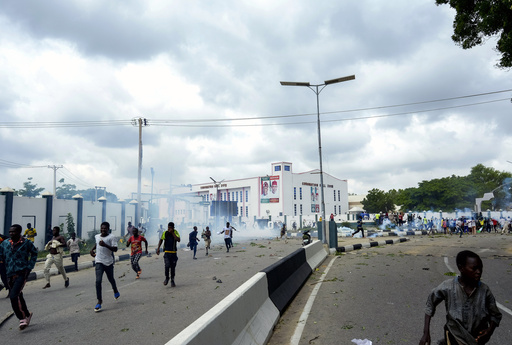
ABUJA, Nigeria — Twenty-nine youths could potentially face the death penalty in Nigeria following their court arraignment on Friday, where they were charged for their involvement in a protest related to the nation’s severe cost-of-living crisis. During the proceedings, four of the youths collapsed from exhaustion before they had a chance to enter their pleas.
A total of 76 individuals who participated in the protests have been charged with ten serious offenses, including treason, vandalism, public disorder, and mutiny, as outlined in the documentation observed. The minors involved in this case are reported to be between 14 and 17 years of age.
The ongoing economic challenges faced by citizens have triggered numerous large-scale protests in recent months. In August, protests demanding improved employment opportunities resulted in the death of at least 20 individuals and hundreds of arrests. The death penalty has been a part of Nigeria’s legal system since the 1970s, although there have been no executions carried out since 2016.
Legal expert Akintayo Balogun emphasized that the Child Rights Act prohibits the criminal prosecution of minors and the imposition of death sentences on them. He criticized the court proceedings, stating, “It is fundamentally wrong to bring minors before a federal high court unless the government can substantiate that these individuals are all over the age of 19.”
The court set bail for each defendant at 10 million naira (approximately $5,900), however, they have yet to meet the challenging conditions attached to the bail, according to Marshal Abubakar, a lawyer representing some of the minors. Abubakar expressed grave concerns, stating, “A nation that has the responsibility to educate its children is now opting to punish those same children. These kids have already endured 90 days in detention without proper nutrition.”
Yemi Adamolekun, the executive director of Enough is Enough—an organization advocating for good governance in Nigeria—questioned the appropriateness of prosecuting minors. She stated, “The chief justice of Nigeria should feel embarrassed; she is both a woman and a mother.”
Despite being one of the leading crude oil producers in Africa, Nigeria grapples with widespread poverty, compounded by systemic corruption that sharply contrasts the affluence of its public officials with the plight of the ordinary citizen. Healthcare workers frequently strike to express their dissatisfaction with low wages, highlighting the dire economic conditions.
The nation’s politicians and lawmakers are often regarded as some of the highest-paid in Africa, with questionable financial dealings. Even the first lady enjoys a lavish lifestyle paid for by taxpayers, despite her role not being delineated in the constitution.
Housing over 210 million inhabitants—making it the most populous nation on the continent—Nigeria also faces staggering hunger rates. The government has struggled to tackle unemployment, and inflation has soared to levels not seen in 28 years, with the naira declining significantly against the dollar.
On Thursday, Nigeria was identified as a “hotspot of very high concern” in a report from United Nations food agencies, indicating that vast numbers of its population are currently confronting or are expected to face critical food insecurity.
